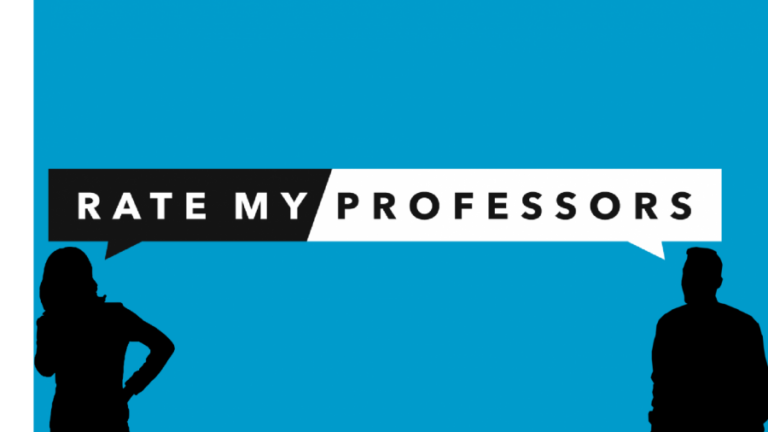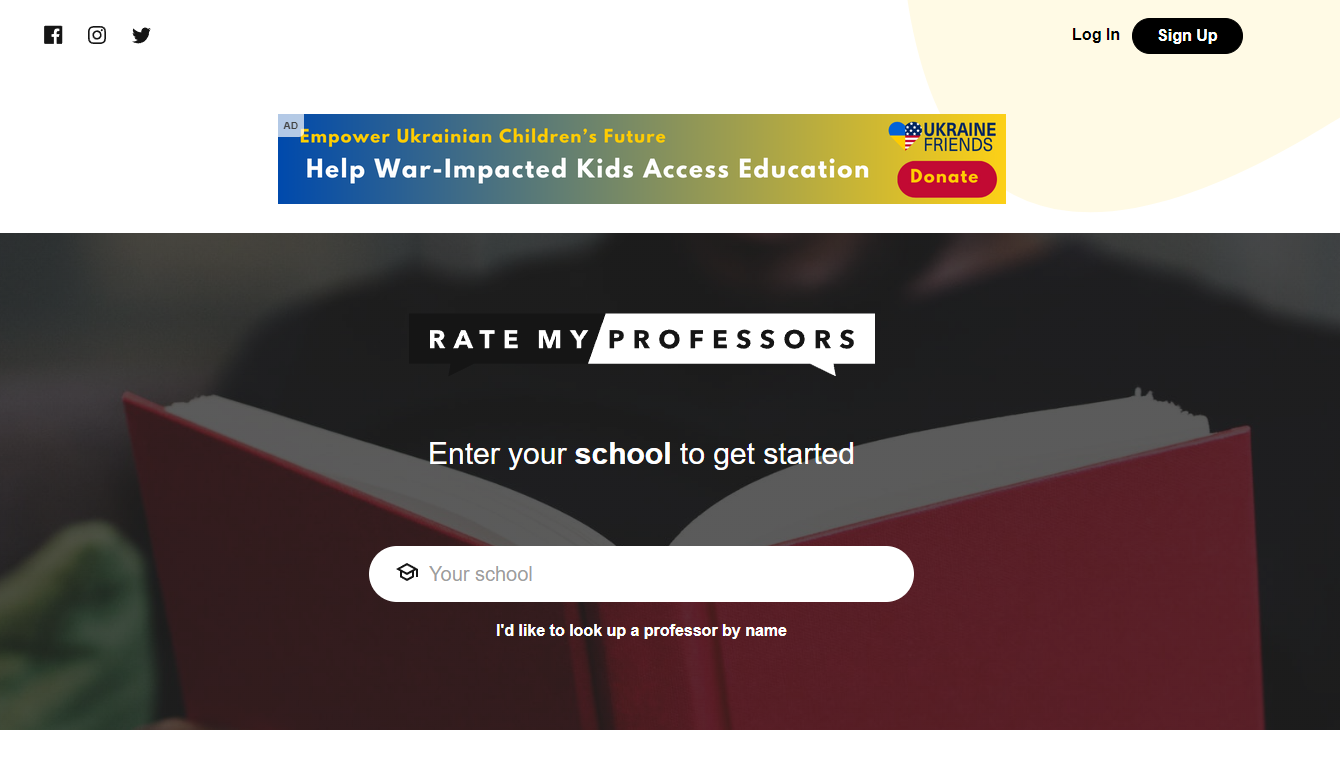Rate My Professor - Student Views And Site Experiences
For many students, the idea of a less-than-stellar review on a teaching evaluation site can feel a bit unsettling, perhaps even a little alarming. Think about it: a biology student might need to take a higher-level course, and that course might be taught by someone who, apparently, is not widely appreciated by those who have taken their classes before. This kind of situation, you know, can make course selection a truly anxious moment for someone just trying to get their degree requirements met.
When it comes to picking classes, especially for those just starting out in college, these sites often become a first stop. They offer, so to speak, a quick collection of thoughts about instructors, helping new students figure out which classes might be a better fit for them, or perhaps which ones to approach with a bit more caution. It's a way, more or less, for students to get a feel for what a class might be like before they even step foot in the lecture hall.
Yet, there's another side to this popular resource, one that brings up questions about personal details and how they are shared. Sometimes, people discover their teaching profile, with all sorts of comments, just out there for anyone to see. It’s interesting, too, that a profile often gets started by someone else, not the instructor themselves. This whole arrangement, you could say, creates a rather unique space for feedback, but also for thought on how we share information.
Table of Contents
- How Do Students Really Feel About Rate My Professor?
- The Student Perspective on Rate My Professor - What Is It Good For?
- The Other Side of Rate My Professor - Professor Concerns
- Does Professor Reputation Matter After Tenure and Rate My Professor?
- Finding the Right Instructor - Beyond Rate My Professor
- Using Rate My Professor Wisely - A Guide for Picking Classes
- Professor Views on Rate My Professor - Managing Online Feedback
- University Life and Rate My Professor - Broader Student Experiences
How Do Students Really Feel About Rate My Professor?
When you talk to a lot of students, you hear quite a range of thoughts about these teaching review sites. Many, it seems, find the information they provide to be fairly true to life. They will often tell you that the site's insights are, in some respects, a good reflection of what a class or an instructor is truly like. This general agreement suggests that for many, the collective opinion found there holds a good deal of weight. It's almost as if students have come to trust this collective voice when making their academic choices.
Yet, some students have a different experience. A few might find themselves in a class with an instructor who, according to the site, is not the best, only to discover that their personal experience is quite different. This can be a bit surprising, you know, when what you read online doesn't quite match up with what happens in real life. It shows that while many find the site accurate, it's not a perfect picture for absolutely everyone.
The site's ability to gather so many different opinions is what makes it, well, useful for many. It's not just one person's idea, but a collection of many, which tends to give it a certain credibility for a lot of students. This collective feedback helps paint a broader picture, allowing students to get a sense of the general feeling about an instructor before they commit to a course. It's a tool, basically, that many lean on.
The Student Perspective on Rate My Professor - What Is It Good For?
For students just starting their college journey, particularly those in their first or second year, a site like this can be a real help. It offers, pretty much, a way to quickly get general information about instructors they might want to steer clear of, or at least be prepared for. Think of it as a quick guide to help avoid potential difficulties in their early courses. This kind of shared wisdom is, actually, quite valuable when you are still getting used to college life and how things work.
A lot of students, you know, wish they had known about these kinds of resources earlier. They often say that a short guide on how to pick instructors, maybe something they could have found before their first or second year, would have made a big difference. It seems that having this kind of insight from the start could really smooth out the course selection process and help them make more informed choices about their academic path.
The site acts, in a way, as a kind of early warning system for some. If an instructor has a lot of reviews, and those reviews are consistently pointing to a particular experience, it gives students a heads-up. This aggregated information is, basically, what makes it so appealing to those looking for a quick sense of what to expect. It's a simple way to gather a general consensus on an instructor's teaching style and course demands.
The Other Side of Rate My Professor - Professor Concerns
From the viewpoint of someone teaching, these sites can present a rather unique set of challenges. It's not uncommon for an instructor to wake up and find their personal information, alongside all sorts of comments, just out there for anyone to see, at any time. This exposure, you could say, can be a bit jarring, as it means their professional reputation is always available for public scrutiny, sometimes with very little control over what is being said.
A significant point of concern for instructors is how a profile gets started on the site. Often, it has to be created by someone else, usually a student, rather than the instructor themselves. This means that instructors don't always have the initial say in whether or not they even have a presence on the platform. It's a situation where, apparently, their online identity is shaped by others from the very beginning.
Some instructors, too, have expressed a strong dislike for these review platforms over the years. They might have looked at their own ratings on these sites, and even if the feedback was mostly good, a few unkind comments could still feel quite bothersome. It's just a little bit frustrating, honestly, to see those occasional harsh words, even when the overall picture is positive. This shows that even largely good feedback can still contain elements that are upsetting to those being reviewed.
Does Professor Reputation Matter After Tenure and Rate My Professor?
A question that sometimes comes up is whether an instructor's standing in the eyes of their academic department still holds much importance once they have secured a permanent position, often called tenure. Some people wonder if an instructor who is already an associate professor, with tenure granted, still cares as much about what students think or say about them online. It's a fair point, you know, to consider if the motivation to maintain a positive public image shifts after achieving such a significant career milestone.
One might think that with job security, the pressure to please students or worry about online comments might lessen. However, even with tenure, an instructor's professional life involves many different aspects, including departmental standing, research collaborations, and attracting good students to their courses. So, in some respects, their reputation, both within the university and among students, could still hold some weight, even if the immediate career implications are different. It's not just about job security, basically.
The idea of finding out who might be considered the least effective or least qualified instructor at a university is, for some, a curious exercise. People might search for this kind of information, perhaps out of general interest or to avoid certain classes. This suggests that the perception of an instructor's quality, as gathered from various sources including review sites, continues to be a topic of discussion and concern among the student body, regardless of an instructor's employment status.
Finding the Right Instructor - Beyond Rate My Professor
While review sites can be a starting point, they are just one piece of the puzzle when it comes to picking instructors. There are, actually, other places students look for information. For example, some universities might have their own internal systems or resources that provide details about courses and instructors. These might include past syllabi, course evaluations, or even academic advising resources that can offer more structured insights.
One student mentioned that for them, another resource, perhaps something called "Gradient," was the primary place to check for instructor information. This suggests that students often use a mix of tools to get a full picture. They might start with a popular review site, but then they cross-reference that with other sources, looking for a more complete understanding. It's a way, more or less, to gather as much insight as possible before making a final decision.
When using these review sites, it's pretty common for students to "read into the reviews" to try and figure out which ones might be based on personal frustration rather than a fair assessment. This means looking for patterns, considering the overall tone, and perhaps dismissing comments that seem overly emotional or specific to one person's bad day. It's about, you know, sifting through the feedback to find the truly helpful bits.
Using Rate My Professor Wisely - A Guide for Picking Classes
When you are trying to select your classes, these review sites can be a tool, but how you use them really matters. If an instructor has a very high rating, say 4.5 out of 5 or more, and a lot of comments, that usually means they are pretty good. This kind of consistent positive feedback from many different students tends to be a strong indicator that the instructor is well-regarded. It's a signal, you could say, that many have had a good experience.
However, it's also important to look at the occasional less favorable comments. Sometimes, an instructor might have mostly good reviews, but then a few that are, you know, a little harsh or rude. It's worth considering these, not to dismiss the instructor entirely, but to get a more balanced view. These less positive comments might highlight specific aspects of a class or teaching style that could be challenging for some students.
A helpful approach is to consider these reviews as just one piece of information, not the complete story. They offer a perspective, but it's important to combine that with other details, such as talking to older students, checking course descriptions, or even looking at sample syllabi if they are available. This layered approach, basically, helps students make choices that feel more considered and less based on just one source of feedback.
Professor Views on Rate My Professor - Managing Online Feedback
For instructors, the presence of their profile on these public review sites can be a source of ongoing thought. They might wonder what they can do about comments that seem less than favorable, or how to manage their online presence. It's a situation where, sometimes, they might wish to remove their profile entirely, but the site's structure often makes that difficult. This means they are often left to deal with the public feedback as it appears.
Instructors might also need to figure out how to get a new profile added to the site if one doesn't already exist for them. This process, too, can be a bit unclear, as it often relies on student submissions. So, while students are leaving comments, instructors are also trying to figure out how to interact with the platform from their side, perhaps to correct information or ensure their courses are listed correctly.
The site provides a way for students to share their thoughts on teaching approaches and specific course content. This user-generated feedback, you know, can be quite varied, covering everything from how an instructor explains difficult topics to the fairness of their grading. For instructors, this means a wide range of opinions is being shared, some of which they might find useful for improving their teaching, and others that might just be frustrating.
University Life and Rate My Professor - Broader Student Experiences
The overall student experience at a university often shapes how people view and use resources like these review sites. For example, a student who transferred to a new university might find they really like their new school, perhaps much more than their old one. They might highlight things like many chances for undergraduate research, which was a big reason they chose that particular place. This positive overall feeling about their university can influence how they approach all aspects of student life, including how they pick their instructors.
Generally speaking, a lot of students report that their time at university has been pretty good. They often mention that the instructors are quite knowledgeable, and a good number of them truly care about preparing students for what comes next in their lives. This general sense of satisfaction with the teaching staff can make students feel more confident in their academic journey, and perhaps less reliant on negative reviews when choosing classes.
Students at different universities might also share their specific experiences. Whether it's seeing what people are saying about a large state university or a well-known private institution, the ability to leave a rating or read others' thoughts is widely available. This widespread sharing of experiences contributes to a collective understanding of what it's like to be a student at various places, and how the instructors contribute to that overall feeling. It's a way, basically, for students to connect and share their lived academic realities.
For some, attending a particular school has been a lifelong dream, and every moment there lives up to what they hoped for. They might talk about an amazing education, a great campus atmosphere, and even the people they meet. In such a positive environment, the weight of a single review, even a less favorable one, might not feel as heavy. It's almost as if the overall positive experience colors their perception of everything, including how they view individual instructors.
This article has explored the many facets of "Rate My Professor," looking at how students perceive its usefulness, the concerns instructors might have about their online presence, and how these sites fit into the broader university experience. We've considered how students use these reviews to make choices, the importance of reading feedback critically, and the ongoing discussion about instructor reputation. It's clear that for many, these platforms are a significant part of the academic landscape, offering both valuable insights and unique challenges for everyone involved.

Rate My Professor: A Comprehensive Review - The Print Media

The best of the worst UC professor reviews on ‘Rate My Professors

Rate My Professor Login Guide